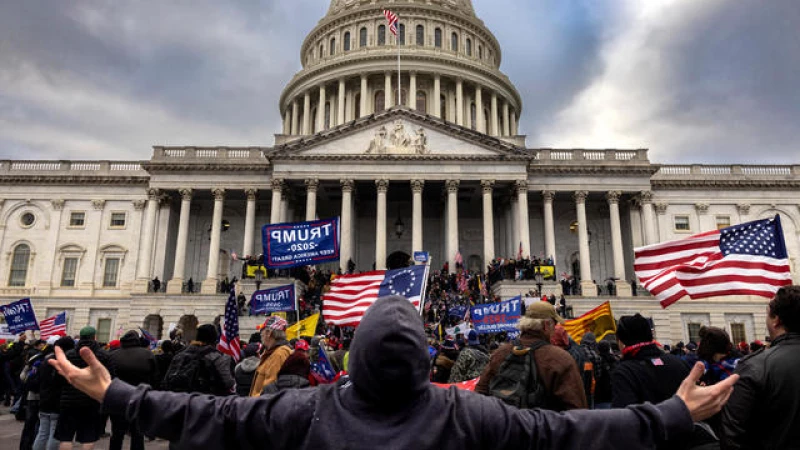Supreme Court to Hear Case on Federal Obstruction Law
Washington — The Supreme Court said Wednesday that it will hear a court fight involving the breadth of a federal obstruction law that has been used to prosecute scores of defendants for their alleged actions during the Jan. 6, 2021, assault on the U.S. Capitol, as well as former President Donald Trump.
An eventual decision from the Supreme Court in the case known as Fischer v. U.S. could have far-reaching impacts, since the Justice Department has charged more than 300 people under the obstruction statute in cases related to Jan. 6.
Most significantly, special counsel Jack Smith has charged Trump with a single count of corruptly obstructing and impeding an official proceeding, namely Congress' certification of the Electoral College results on Jan. 6. The former president has pleaded not guilty to that offense and the three others he is facing in the case related to the 2020 presidential election. A trial in Trump's case is set to begin in March.
The Supreme Court Case
Requests for the Supreme Court to weigh in arose from three criminal prosecutions in the federal district court in Washington, D.C., of defendants facing charges stemming from their participation in the assault on the Capitol.
Three individuals, identified as Edward Lang, Garrett Miller, and Joseph Fischer, have been charged with corruptly obstructing, influencing, or impeding an official proceeding. This charge is in accordance with a provision of the Sarbanes-Oxley Act, which was enacted in 2002 after the Enron scandal.
In the case of Miller, the U.S. district court has granted his request to dismiss the obstruction count. The court determined that although the joint session of Congress on January 6th was indeed an official proceeding, the alleged conduct mentioned in the indictment fell outside the scope of the law. The court clarified that the provision is limited by previous language in the statute, stating that it only applies if a defendant takes "some action with respect to a document, record, or other object in order to corruptly obstruct, impede, or influence an official proceeding."
The district court highlighted that the prosecutors did not accuse Miller of taking any action regarding documents, records, or other objects to corruptly obstruct, impede, or influence Congress's certification of the electoral vote.
Applying the same reasoning, the court also dismissed the obstruction counts against Fischer and Lang. However, the U.S. Court of Appeals for the District of Columbia Circuit reversed the dismissal orders. A three-judge panel, with differing opinions, concluded that the law "applies to all forms of corrupt obstruction of an official proceeding." They stated that the lower court had erred in interpreting the provision to only cover actions related to documents, records, or other objects.
Miller, one of the defendants in the Capitol riot case, has been sentenced to 38 months in prison and three years of supervised release. During the appellate proceedings, federal prosecutors dropped one of the counts against Miller for transmitting a threat in interstate commerce, and he pleaded guilty to the remaining charges.
The Supreme Court has received an appeal from the three defendants, questioning whether their alleged conduct on January 6th falls within the scope of the obstruction statute. Each defendant has different reasoning as to why their alleged acts should not be covered by the law.
Other individuals who entered the Capitol on January 6th and were prosecuted under the same measure have also urged the Supreme Court to intervene. Lawyers for three other Capitol defendants have stated that trial courts, prosecutors, and defense attorneys lack clear guidance on the requirements or scope of the obstruction law in their filing to the justices.
They have argued that the three judges on the D.C. Circuit, Judges Gregory Katsas, Justin Walker, and Florence Pan, have not reached a consensus on what conduct violates the statute. They have also expressed concerns that the broad interpretation of the law would encompass any unlawful act connected to an official proceeding.
The Biden administration has urged the Supreme Court to reject the cases involving individuals accused of obstructing an official proceeding on January 6th. The administration argues that the obstruction provision is broad enough to cover the conduct of the rioters and includes actions directed at the official proceeding itself. Solicitor General Elizabeth Prelogar, who represents the government before the high court, stated in a filing that the defendants obstructed the proceeding by physically blocking it from occurring, as demonstrated when they violently occupied the Capitol and prevented Congress from carrying out its work. The administration also cautioned that it is premature for the Supreme Court to intervene in these cases since none of the defendants have been convicted of obstructing an official proceeding.







